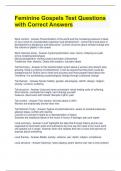Exam (elaborations)
Feminine Gospels Test Questions with Correct Answers
- Course
- Institution
Feminine Gospels Test Questions with Correct Answers Work context - Answer-Personification of the world and the increasing pressure it takes on as a result of unsustainable expansion and development - current level and pace of development is dangerous and destructive. Current concerns about clima...
[Show more]



